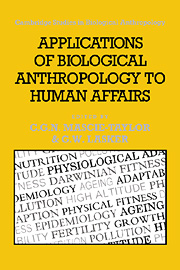Book contents
- Frontmatter
- Contents
- List of contributors
- 1 Introduction
- 2 Reproductive ecology and human fertility
- 3 Nutritional status: its measurement and relation to health
- 4 Pollution and human growth: lead, noise, polychlorobiphenyl compounds and toxic wastes
- 5 Human physiological adaptation to high-altitude environments
- 6 Darwinian fitness, physical fitness and physical activity
- 7 Human evolution and the genetic epidemiology of chronic degenerative diseases
- 8 The biology of human aging
- Index
3 - Nutritional status: its measurement and relation to health
Published online by Cambridge University Press: 03 May 2010
- Frontmatter
- Contents
- List of contributors
- 1 Introduction
- 2 Reproductive ecology and human fertility
- 3 Nutritional status: its measurement and relation to health
- 4 Pollution and human growth: lead, noise, polychlorobiphenyl compounds and toxic wastes
- 5 Human physiological adaptation to high-altitude environments
- 6 Darwinian fitness, physical fitness and physical activity
- 7 Human evolution and the genetic epidemiology of chronic degenerative diseases
- 8 The biology of human aging
- Index
Summary
Over the past 25 years nutritional status has been increasingly assessed by anthropometry. It is assumed that nutritional problems are manifest as biological effects in individuals, especially growing children. Growth and growth failures are thus an important way to assess these problems (Bogin, 1988). Anthropologists have developed such assessments and these have become an important application of biological anthropology.
Undernutrition is a state of ill-health caused either by an inadequate dietary intake of energy and/or specific nutrients or by excessive losses of protein, etc., in diarrhoeal disease or of iron in haemolytic/haemorrhagic disorders. The four most common types of malnutrition are protein energy malnutrition (PEM), and deficiencies of iron, Vitamin A and iodine (Latham, 1987).
It is thought that PEM affects over 500 million children, most of whom live in the developing countries of Asia, Africa and the Americas, and that 10 million a year die from the direct or indirect effects of PEM. The World Health Organization (WHO) estimate that 350 million women of childbearing age suffer from iron deficiency anaemia. Endemic goitre and cretinism resulting from iodine deficiency affect over 150 million people and in areas where goitre is endemic it is estimated that 1.5% of the children born have severe mental and physical retardation (cretinism). Thus, 250 000 children are born each year with cretinism solely because of a maternal iodine deficiency.
- Type
- Chapter
- Information
- Applications of Biological Anthropology to Human Affairs , pp. 55 - 82Publisher: Cambridge University PressPrint publication year: 1991
- 6
- Cited by



